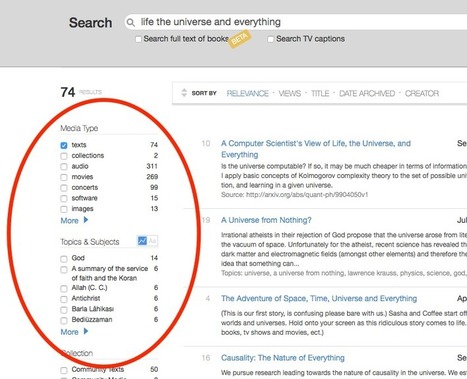With over 20 million items in the Internet Archive’s many collections, having a good way to search through them to find exactly what you want is crucial. It is equally important to be able to filter the data in flexible ways so that you see subsets of the data most relevant to you. We are pleased to offer two new features that might change everything about how you search.
Faceted Filtering
Once you’ve executed a site search, either from the search form at the top right of every page or by going to the search page directly, you’ll see a bunch of new checkboxes down the left-hand side, in addition to the search results. These checkboxes are grouped into categories, such as “Media Type” and “Topics & Subjects”.
Clicking any of the checkboxes adds the corresponding term to the search criteria, allowing you to more precisely define the filtered set of search results. Checkmarking more than one term within the same category causes items that match any of the selected terms to be displayed, whereas checkmarking items from two different categories means that only items matching both terms will be shown. Play around with it, and you’ll see how intuitive it is. Checking or unchecking new terms causes search results to be re-filtered on the fly....
Research and publish the best content.
Get Started for FREE
Sign up with Facebook Sign up with X
I don't have a Facebook or a X account
Already have an account: Login
Social marketing, PR insight & thought leadership - from The PR Coach
Curated by
Jeff Domansky
 Your new post is loading... Your new post is loading...
 Your new post is loading... Your new post is loading...
|
|












The Internet archive is a valuable collection of historical websites. The new search capability is helpful.